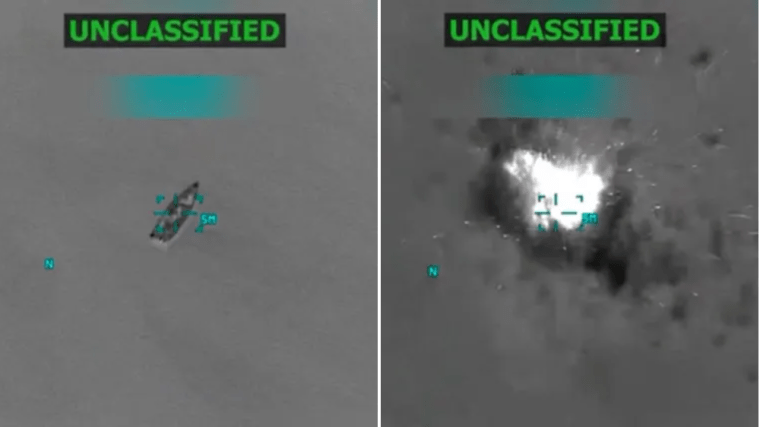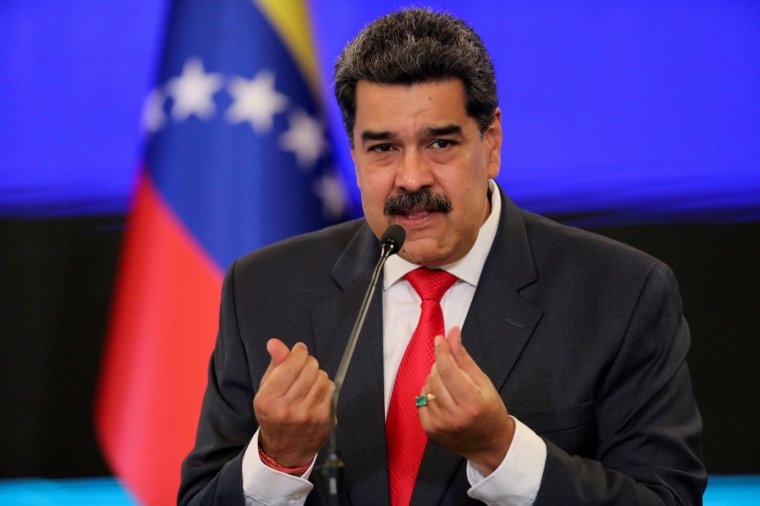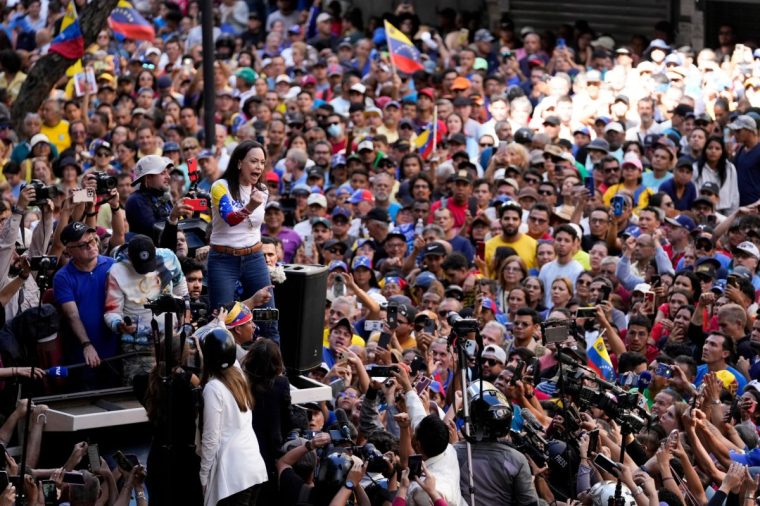‘At some point, internal enemies will arise, but Maduro has built a resilient authoritarian system with himself firmly embedded in its core,’ one expert tells The i Paper
Donald Trump is hoping to break apart Venezuela’s political elite and push Nicolás Maduro out of power with his threat to invade the South American country, experts have told The i Paper.
Speaking from the White House on Wednesday, the US President confirmed he had authorised the CIA, America’s foreign intelligence agency, to conduct secret operations inside Venezuela, which has been governed by Maduro since 2013.
The unusual admission came after the US staged a series of deadly air strikes against alleged drug-smuggling boats in the Caribbean Sea in recent weeks, which have killed 27 people. At least six strikes are believed to have been carried out, with the latest occurring on Thursday.
Asked why he had authorised the CIA to take action, Trump said: “No 1, they have emptied their prisons into the United States of America… and the other thing, the drugs, we have a lot of drugs coming in from Venezuela, and a lot of the Venezuelan drugs come in through the sea.”
Trump also said his administration “is looking at land” as it considers further strikes in the region – suggesting for the first time that the US could launch a direct assault on the oil-rich territory.
In response, Maduro pointed to “failed wars” in Afghanistan, Iraq, Libya and said: “No to CIA-orchestrated coups d’état.”
Deploying US troops to the region
The US is believed to have deployed around 6,500 troops in the Caribbean, alongside guided missile destroyers, F-35 fighter jets and a nuclear submarine.
Meanwhile, a group of Democratic and Republican US Senators announced plans on Friday to force a vote on a resolution to prevent military action against Venezuela without congressional authorisation, aiming to ease the rapidly escalating tensions between the two nations.
Experts told The i Paper that while a ground invasion remains unlikely, Trump will be hoping that his threats alone will be enough to sow division among Maduro’s allies, weakening the president’s grip on power.
“What we’re probably seeing is coercive signalling – splashy statements meant to inch up the chances that the ruling cabal fractures,” said Christopher Blattman, a professor of global conflict studies at the University of Chicago. “Maybe it will help. Probably not,” he added.

“Trump would have little to gain and much to lose by invading Venezuela,” said Tom Long, a professor of politics & international studies at the University of Warwick.
“Instead, it appears the aim is to rattle the officers of the Venezuelan military, offering carrots like the reward on Maduro, and sticks like the recent attacks and threats of escalation,” he added. “One can suspect that there is more going on behind the scenes, too.
“This is not a huge switch from the policy of the first Trump administration… the hope was that international pressure, combined with demonstrations within the country, would fragment Maduro’s coalition.”
Maduro claimed a second presidential term in 2018, winning an election marred by opposition boycotts and claims of widespread vote rigging. In its aftermath, Trump recognised opposition leader Juan Guaidó as president, alongside a coalition of more than 50 governments, including the UK, Germany and Brazil.
Even so, Trump was forced to deny his administration had been involved in an attempt to oust Maduro in 2020, after two former US Green Berets were arrested as part of a failed coup.
“Donald Trump is behind all of this,” Maduro said at the time, despite Trump’s denials.

(Photo: Reuters)
The US previously denied involvement in a 2002 attempt to remove Maduro’s predecessor, Hugo Chávez, from power, though it is widely accepted that the White House funded the groups involved and was warned in advance about the operation.
‘Hard to see that anything could make Maduro leave’
Despite having the world’s largest known oil reserves, Venezuela has been plagued by decades of economic turmoil, with around 86.9 per cent of the population facing poverty in 2024, according to civil society group HumVenezuela.
Venezuela’s oil exports dwindled while its government debt more than doubled under Chávez, who was succeeded by Maduro after his death in 2013.
Washington has imposed sweeping sanctions on Venezuela, including restrictions on access to international financial markets for its government and state-owned oil giant Petróleos de Venezuela SA, introduced during Trump’s first administration.
Despite this, Venezuela has retained oil-trading partners, with support from countries such as China, Iran and Russia being key to keeping Maduro’s regime afloat.
“Basically, it’s hard to see that anything could make Maduro leave other than assassination – illegal obviously, and hard to control the aftermath – or actual armed intervention,” said Kathryn Hochstetler, a professor of international development at the London School of Economics (LSE).
Even so, Maduro’s grip on power, coupled with sustained economic hardship among Venezuela’s population, has made outbreaks of public unrest a regular occurrence.

The most recent major flare-up took place after Maduro’s controversial election victory in 2024, which sparked widespread protests and led to the arrest of hundreds of people by the security forces – which remain widely loyal to the president.
Long said that Maduro has managed to hold together sufficient support to keep himself in power, “and his position within Venezuela is probably stronger today than it was in 2019-2020… at some point, internal enemies will arise, but Maduro has built a resilient authoritarian system with himself firmly embedded in its core.”
This means that Trump’s attempts to stir up unrest may fail unless he’s ready to take the next, dramatic step and send in US forces.
Long adds that a US strike on Venezuelan soil would likely “prompt a much stronger repudiation from much of Latin America than the actions at sea,” adding that it would be “an attack on core Latin American diplomatic values, not to mention a violation of international law and inter-American agreements.”
Thomas F. Purcell, a senior lecturer in international political economy at King’s College London, told The i Paper that the recent US strikes on ‘narco’ boats look like a play to Trump’s domestic audience.
“While this has rattled the Maduro regime, he remains ensconced with the Venezuelan military, the domestic opposition is in disarray, and the prospect of invasion seems to have given the regime more reasons for domestic control and oppression.”
Despite Trump’s strong words, Hochstetler suggested that armed intervention from the US would mark a “dramatic departure” from the country’s recent foreign policy.
“While there were historically many, many US invasions and forced regime changes in Latin America, there have not been actual US troops fighting on the South American landmass since the US supported Panama’s separation from Colombia in 1903,” she said.
This means that attempts to sow divisions in Venezuela’s ruling elite remain the most likely move in Trump’s playbook.
